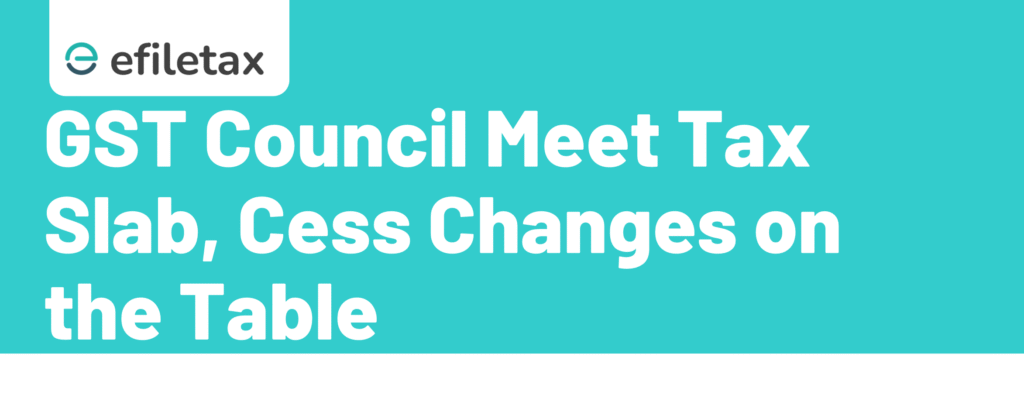
GST Council Meeting: What’s Changing in Tax Slab Rates & Compensation Cess
The upcoming GST Council meeting has stirred attention across industries, especially regarding tax slab rates and the future of the compensation cess. With inflationary pressures and state demands mounting, the Council’s review could bring structural shifts in indirect tax policy.
Here’s a simplified breakdown of what’s on the table, and how it could impact your GST compliance.
Why the GST Council Review Matters
The GST Council, chaired by the Union Finance Minister and comprising state finance ministers, is the apex decision-making body on indirect taxation in India.
In this session, key focus areas include:
- Rationalisation of GST tax slabs
- Review of compensation cess collections and extension
- States’ concerns over revenue shortfalls
- Industry push for rate cuts in core sectors
Current GST Tax Slabs: A Quick Recap
| Slab | Rate | Common Goods/Services |
|---|---|---|
| Nil | 0% | Unbranded food, health services |
| 5% | 5% | Food grains, transport, footwear |
| 12% | 12% | Mobile phones, garments |
| 18% | 18% | Most services, electronics |
| 28% | 28% | Luxury items, sin goods |
Source: CBIC GST Rate Schedule
Possible Tax Slab Changes in This Council Meeting
There have been long-pending discussions on merging 12% and 18% slabs into a single rate to simplify the structure and reduce classification disputes.
Expected reforms:
- Merge 12% and 18% into a common 15% or 16% slab
- Re-classify items to prevent inverted duty structure
- Boost revenue neutrality while easing compliance
This restructuring was first recommended by the Group of Ministers (GoM) in 2022, and now revived post-Lok Sabha elections for implementation in FY 2025–26.
Compensation Cess: Will It Be Extended Again?
Compensation cess was introduced under Section 8 of the GST (Compensation to States) Act, 2017 to compensate states for revenue loss due to GST rollout.
Originally planned for five years (till June 2022), it has already been extended till March 2026 to repay borrowings made during the COVID period.
Key points under review:
- States may demand another extension beyond 2026
- Demand from states to keep cess fund exclusively for state compensation, not debt repayment
Legal Reference: GST (Compensation to States) Act, 2017
Expert View: Will Rationalisation Help or Hurt?
“Merging slabs sounds simple, but it’s a balancing act. If not done carefully, it could either push up prices or shrink GST collections. Also, any slab change needs careful reclassification of goods to avoid confusion at ground level.”
— CA K. Sridhar, Indirect Tax Expert
Practical Tip:
Businesses should track HSN-wise classification updates after the Council’s decision. Changes in tax rate or slab mean updated invoicing, ERP reconfiguration, and possibly fresh ITC calculations.
What’s at Stake for Businesses?
- Input Tax Credit (ITC) mismatches if slab changes are delayed in systems
- Increased compliance costs if rate changes are not auto-updated
- Impact on working capital if cess collections shift priorities
What Should You Do Next?
- Follow the official CBIC Twitter handle and GST Council press releases
- Subscribe to Efiletax for rate notifications, slab updates, and classification alerts
- Recheck your item-wise GST rate mapping post-meeting
FAQ
Q1. Will 28% GST slab be reduced?
No formal proposal yet. Luxury and sin goods are likely to remain in the 28% slab due to high revenue dependency.
Q2. Can compensation cess apply to new items?
The cess remains limited to luxury, tobacco, coal, and automobile segments.
Q3. Will merging 12% and 18% increase my GST liability?
Depends on your current goods/services classification. A merged rate of 15–16% could increase tax for 12% items and reduce for 18%.
Summary
GST Council meeting may bring major changes to tax slab rates and compensation cess structure. Businesses must prepare for slab merger, ITC recalibration, and state-centre cess negotiations.
Conclusion: Stay GST-Ready with Efiletax
If you’re unsure how these changes affect your business, let Efiletax handle it. We decode every GST Council update into practical, client-ready actions — from rate reclassification to ITC tracking.
👉 Book a free consultation now and stay compliant with expert support.